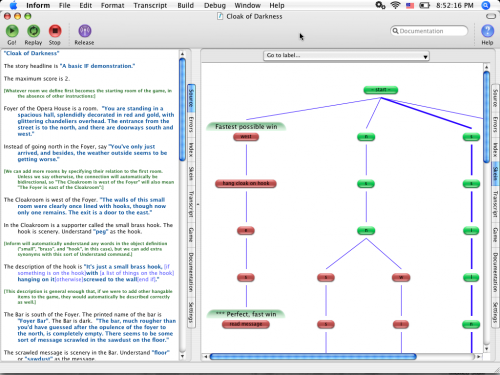You are here
Procedural Enthymeme with Inform7
Primary tabs

Screenshot of Inform7 Interface
Even though we use enthymemes in our everyday speech, teaching the concept presents difficulties. By making enthymemes in the interactive fiction design system Inform7, students develop a deep understanding of implied reasoning. They also learn procedural reasoning, or how the authorship of rules that constrain action might also make claims.
Teach procedural rhetoric and implied reasoning.
The Inform system has several versions: 6 is very good. 7 is the most recent release. Inform is available for free download.
Like any software that offers a large and complex array of capacities, Inform 7 takes time to learn. On the other hand, you can begin using the software to good effect without a complete proficiency with its affordances.
This lesson will be most succesful when it serves as a major course assignment. The hardest part is teaching Inform: there are several user-friendly tutorials, screencasts, and manuals on the Inform website. Learning this software can be assigned as homework and can also be brought into the classroom. It is important to set minimum requirements in order to reduce student anxiety. E.g. Create a place. Create four different descriptions for when the user looks north, west, east, and south. Create an object. Create an event when the user interacts with the object. To achieve these tasks, the students will learn enough about the Inform interace to start creating procedural enthymemes.
A procedural enthymeme describes a set of rules that, in constraining an interactor's actions, makes an implicit claim. The user must reason out what this claim is in order to correctly manipulate the system. Procedural enthymemes are conscipicuous in video games. (Example: An avatar can only enter a house through the door, and not through the window, implying that a person does not enter a stranger's house through the window, unless they are a ne'er-do-well). It may be helpful to teach language-based enthymemes before moving on to the more complex idea of procedural reasoning: "We'd better knock, in case someone's home. We don't want them calling the cops."
In Inform, students author procedural enthymemes every time they create an object's capacities for interaction. Excluding certain capacities requires the user to reason:
Input: Go to car. Output: The car looks shiny and new. Input: Enter car. Ouput: The car is not yours. Input: Break window. Output: There are people nearby.
The final part of this assignment has students articulate the implied reasoning in the procedural affordances they've created.
Take some time to create interactive objects in Inform before you have your students do so.
These instructions will differ depending on how you approach this lesson. One option:
Day 1
1) Articulate the implicit reasoning that links the following premises and conclusions. (Enthymeme's provided by instructor.)
2) Write five enthymemes of your own.
Homework:
1) Create a place in Inform.
2) Create a command to view in four directions.
3) Create a description of what the user sees in each direction.
Day 2
1) In Inform, create four objects.
2) Create a command that interacts with each object.
Homework:
1) What actions did you make available to the user with regard to each object?
2) By excluding all other actions, what do you imply about this object/your world? (It might be useful to have the students make fantasy-worlds, since the defamiliarization will make more visible the significance of providing such and such affordances .)
Day 3
1) Interact in each other's Inform "worlds."
2) Locate procedural enthymemes.
(Instructor leads class discussion.)
This assignment might be evaluated in any number of ways. Learning Record users will want to ask students to observe what they made, why, how they understand enthymemes and procedural enthymemes, etc. Letter or percentage-based graders may measure complexity of affordances, ability to articulate the implicit premise or conclusion, creativity of object-capacitiy or Inform "world."
This assignment would be appropriate in advanced computers and composition courses. Courses on the rhetoric of video games are espeically well-suited for this lesson.
-

- Log in to post comments

